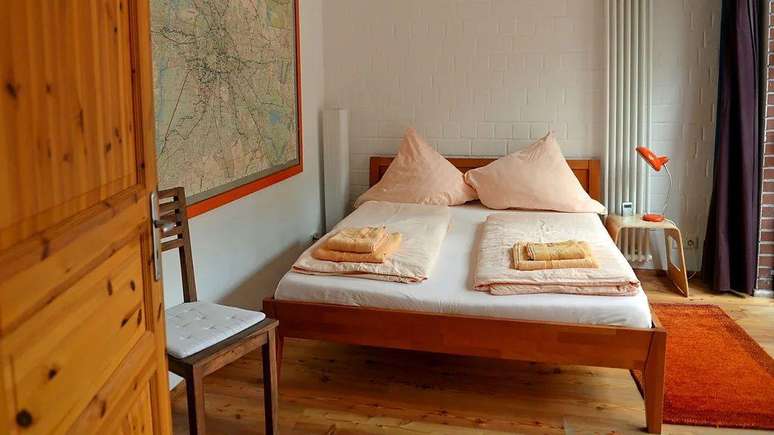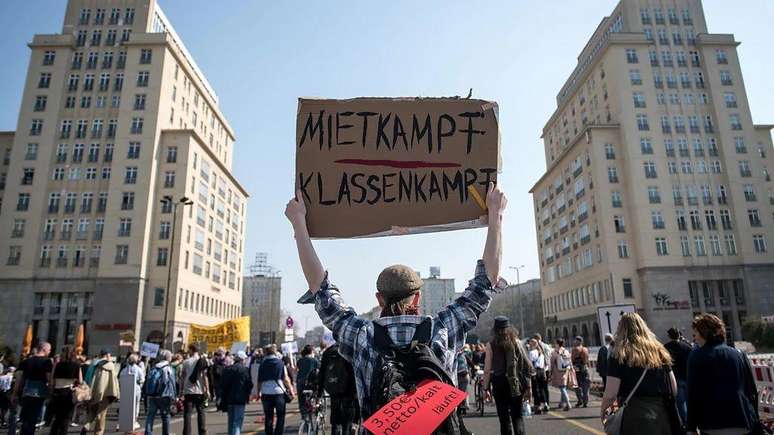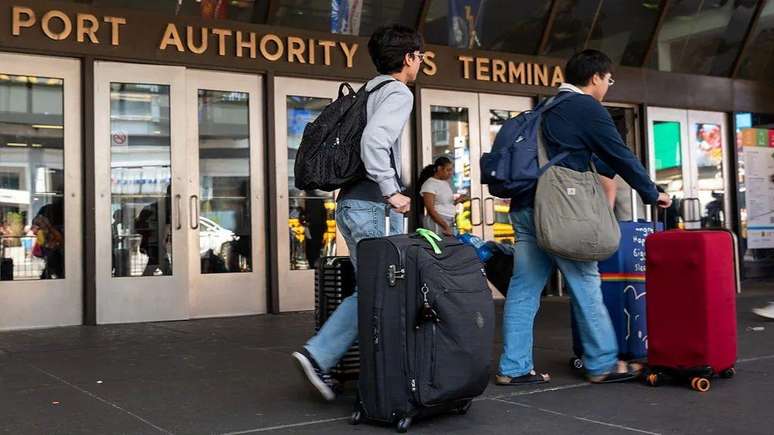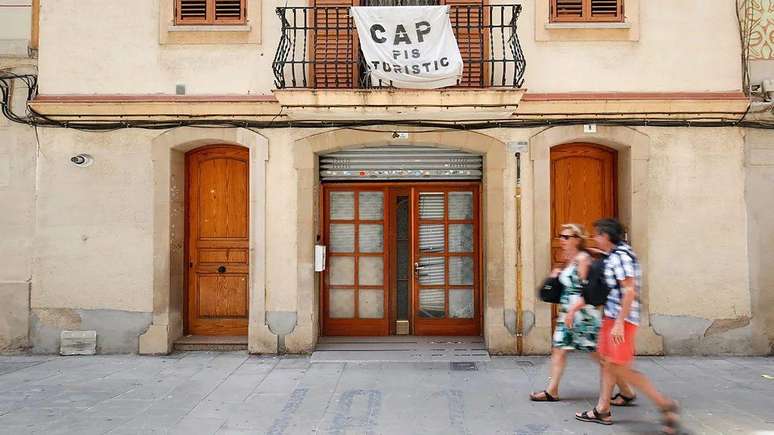Cities including Barcelona and New York have decided to ban short-term rental companies, which they accuse of increasing housing costs and harming local residents.
On June 21, the mayor of Barcelona, Spain, Jaume Collboni, announced his plan to ban short-term rentals in the city, starting in November 2028.
The move aims to address what Collboni describes as “Barcelona’s biggest problem”: the housing crisis that has pushed residents and workers out of the housing market due to high property prices. The measure will return to the housing market the 10,000 apartments currently assigned for short-term rentals on Airbnb and other similar platforms.
Barcelona is not the only city to create strict regulations, or even ban, short-term rentals.
As of September 2023, it is illegal to rent apartments for short periods in New York, United States, unless the owner is domiciled in the city and is present in the property at the time of the rental. This measure was also adopted to alleviate the city’s housing crisis.
The German capital, Berlin, banned Airbnbs and short-term rentals back in 2014. They returned in 2018, with severe restrictions. And many coastal cities in California, including Santa Monica, ban or impose severe restrictions on short-term rentals.
The whole movement is part of a larger issue.
Airbnb dominates the short-term rental market, with over 50% of all online bookings. It and other platforms, such as VRBO, Booking.com and Expedia.com, are being questioned, with parallel questions emerging such as who benefits from tourism and where is the balance between the benefits for tourists and locals.
Since its launch in 2007, Airbnb has massively disrupted the travel industry. It offers flexible accommodations in cities around the world, with a promise of “living like a local” that hotels can’t deliver.
Recent years have seen backlash against the brand. It is accused of increasing accommodation costs and harming local residents, who feel forced to live next to unregulated hotels.
But what do we gain and what do we lose without the short-term rental market for tourists?

“Short-term rentals offer the chance to stay somewhere a little more authentic,” says Lucy Perrin, travel editor and hotel expert at The Times.
“It’s a less impersonal experience, more local, and of course the prices can be better,” he says. “They tend to work well with families, groups, and more adventurous travelers. People who are looking for a security blanket, where they know exactly what they’re going to get, tend to stay in hotels.”
It seems clear that the elimination of short-term rentals from the travel market will lead to an increase in the prices of accommodation for tourists.
“I would be surprised if hotels didn’t take advantage of this situation,” says Perrin.
For Caitlin Ramsdale of family travel platform Kid & Coe, the obvious losers are families.
“There are a lot of groups for whom having hotels as their only option just doesn’t work,” she says.
“While the hotel industry has focused a lot of effort on welcoming families, room layouts and pricing just don’t work for the majority of families looking for short trips, especially those with two or more children. There needs to be a way to balance budgets with the city’s goals in serving this segment of travelers, which is a huge loss for parents who want to introduce their kids to the world.”
The question is: does banning or limiting short-term rentals actually reduce the cost of housing or affect the amount of housing available?
A Harvard Business Review study on the impact of the ban in New York, published earlier this year, concluded that short-term rentals are not the most important factor in the rent increases in this case. The study also indicated that regulations, rather than bans, would offer greater benefits to the city and local residents.
One clear result of the ban was the increase in hotel room rates in New York, which reached a record average of $300 (about R$1,650) per night.

But why do tourism officials and city councils resort to bans? The real reason may not just be a matter of numbers, but also how local residents think about tourism.
Spain, for example, is the epicenter of the mass tourism crisis in Europe. Local residents express strong opposition to tourism, which they perceive as an industry that does not bring them any benefits. This movement is taking place in traditional destinations such as Málaga, Mallorca and the Canary Islands, as well as the city of Barcelona itself.
In many ways, this appears to be the progression of the “second home” debate that has raged for decades in some places, such as Cornwall in the UK.
In tourist-filled cities, residents are routinely priced out of the housing market by high prices. They are forced to live in their cars or endure hours of commuting to work each day.
In this situation, it seems extremely unfair to find cities occupied by vacation rental properties, which remain closed for much of the year and could benefit local residents.
This is not the only cause of the housing crisis. Stagnant wages, especially for public employees, and limited housing programs also play a role. But this is certainly the most visible reason.
In British Columbia, Canada, Premier David Eby addressed the issue succinctly when he outlined the province’s new rules on short-term rentals:
“If you’re selling homes, if you’re buying short-term rentals, if you’re buying a home and vacating it, let’s send this message consistently, publicly and repeatedly: Don’t let families and individuals who are looking for a place to live compete with your investment dollars.
Whether successful or not, the bans send a signal to local residents that politicians are listening to their concerns and will give them priority over tourists. But there is an alternative to a total ban.
Many destinations, such as Berlin, limit owner-occupiers to a maximum rental period of 90 days per year. This restriction allows temporary hosts to continue earning extra income, but prevents professionals from purchasing properties to turn into full-time short-term rentals.
The discussion in all countries that are taking this path – including the United Kingdom, which has put forward a similar proposal – is that of regulation. How and how much does it cost to regulate this situation?

For tourists, the news seems to be mostly bad. When it comes to limiting short-term rentals, hotels and Airbnb seem likely to be the biggest winners. Demand outstrips supply and they can charge what they want without much competition.
But Perrin notes the advantages in terms of the tourist experience.
“I think the ban on short-term rentals will make travel to cities like Barcelona more authentic,” he said. “When residents are pushed out of the city center, it can lose some of the vibrancy and culture. This will make the experience better.”
“I think tourists will have to be more creative about where they stay and maybe be guided to cities where they can alternate between different places.”
“In the long run, I think the ban will provide a richer experience for tourists and less animosity towards locals, which is ultimately a good thing,” concludes Lucy Perrin.
Read the original version of this report (in English) on the BBC Travel website.
Source: Terra
Rose James is a Gossipify movie and series reviewer known for her in-depth analysis and unique perspective on the latest releases. With a background in film studies, she provides engaging and informative reviews, and keeps readers up to date with industry trends and emerging talents.







